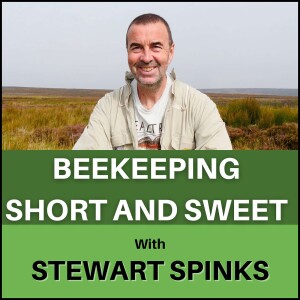
Hi, I’m Stewart Spinks and welcome to Episode 123 of my podcast, Beekeeping Short and Sweet. If you’re worried about getting your bees prepared for Autumn and Winter then stay tuned for some simple advice to help take the worry out of those long Winter nights.
Do take a look at the extra content available on my patreon page, that’s www.patreon.com/norfolkhoney
I’m grateful to Honey Paw hives for sponsoring, in part, our podcasts for this season. Honey Paw hives are, as I’m sure you’re aware, Poly Langstroth hives and we’re setting up an apiary full of their hives this season courtesy of Honey Paw. Check out their range of hives and other equipment on their website, I’ll leave a link to their website in the show notes as usual.
Honey Paw Hives - Designed by Beekeepers, For Beekeepers.
Another week and August is slipping quickly by, I woke this morning and felt a distinct but subtle change in the air. As I got into the truck to head up to my allotment it struck me that there was a much fresher feel to the air and I noticed quite a lot of condensation on the windscreen. That’s not to say Summer is gone but it certainly had a feel of a shift in conditions. We’ve actually just come through a period of quite unsettled weather with very high temperatures and thundery downpours, I got caught out by one just a day ago and it decimated my giant dahlia flowers. We don’t have much of a front garden here at home, it’s all shingle with a small flowerbed in the middle, literally a metre square but this year I planted some dahlias in it and they’ve been fantastic. We’ve had some enormous flower heads but with that comes the risk that in a heavy downpour they get shot to pieces, petals everywhere and that’s just what happened yesterday.......
........One question that I get asked regularly every year at this time is very specific to National bee hives. The National brood box can be a little on the small side and the colony needs a little extra space in the form of a super placed with the brood box having first removed the queen excluder. But the question is where do you put the super, does it go above the brood box or beneath the brood box?
Well, once again we are likely to have a difference of opinion but for the sake of throwing my hat into the ring, I would say for all of our National brood boxes that are not on double brood I always place the super between the floor and the brood box, so that’s beneath the brood box.
I do this for two reasons, firstly I find that lifting the brood box a little higher above the floor makes me feel the bees are a little further away from any cold drafts that might blow under the floor, I am using open mesh floors throughout and I don’t insert the varroa board for the winter months at all.
Secondly, I very rarely find the queen has moved down into the super and started laying eggs in the Spring so I can easily swap the super back up above the brood box with the queen excluder replaced between them. When I used to experiment with the position I often found the queen had moved higher into the super and started laying eggs in there, making it more difficult to manage in the Spring.
It’s a point I’m sure will keep beekeepers discussing over their beers at virtual beekeeping meetings as we head into the Autumn period. Just to add, this is why I prefer the Commercial brood box over the National, I don’t need to leave a super on as the Commercial has plenty of room for both bees and food for the winter.
That’s it for another week, if you haven’t yet checked out all of this seasons videos so far do pop over to my patreon page, that’s www.patreon.com/norfolkhoney
I’m Stewart Spinks
And that was Beekeeping Short and Sweet
More Episodes
 2024-11-03
2024-11-03
 2024-10-27
2024-10-27
 2024-10-20
2024-10-20
 2024-10-13
2024-10-13
 2024-10-06
2024-10-06
 2024-09-29
2024-09-29
 2024-09-22
2024-09-22
 2024-09-15
2024-09-15
 2024-09-08
2024-09-08
 2024-09-01
2024-09-01
 2024-08-25
2024-08-25
 2024-08-18
2024-08-18
 2024-08-11
2024-08-11
 2024-08-04
2024-08-04
 2024-07-28
2024-07-28
 2024-07-21
2024-07-21
 2024-07-14
2024-07-14
 2024-07-07
2024-07-07
 2024-06-30
2024-06-30
Create your
podcast in
minutes
- Full-featured podcast site
- Unlimited storage and bandwidth
- Comprehensive podcast stats
- Distribute to Apple Podcasts, Spotify, and more
- Make money with your podcast
It is Free
- Privacy Policy
- Cookie Policy
- Terms of Use
- Consent Preferences
- Copyright © 2015-2024 Podbean.com





